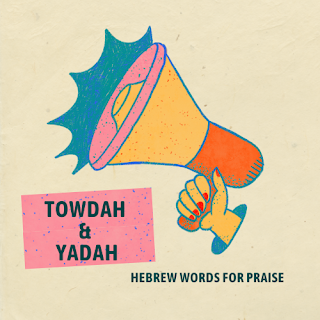Hebrew Words For Praise: Towdah & Yadah
Psalm 95:2 “Let us come before Him with thanksgiving and extol Him with music and song.
1 Chronicles 16:34 “Give thanks to the LORD, for He is good; his love endures forever.”
There was this church camp I went to for a week every summer. It was legendary. It was where I first met the Lord. There were always great speakers, a rockin’ house band, neon lights, church devos, friends you only saw one week every year but who felt like family, an epic candlelight communion service…it was wild. And every person who went to this camp knew that no matter what else happened, the communion service and praise and worship with Pastor Todd were the two camp staples that would never change.
The thing about Pastor Todd was that for most of us, we had never met a pastor like him. In addition to being incredibly talented, Pastor Todd was one of the most consistent people I’d ever met. You could always tell which song he was about to lead because his intros never changed, and it was to the point that he could say one word and play one cord and 500 high school students would immediately know what was happening next. One of the things you always knew PT would talk about was the word towdah, which is one of the Hebrew words for praise. He would say towdah and everyone who had been to camp before would immediately raise their hands. It was a sight to behold. Towdah became one of my favorite parts of worship—and the freedom to participate in it in a room full of people who were doing the same thing is something I was always grateful for. The physical act of doing something, of giving something, to praise the Lord has been a powerful lesson for me. A physical response in worship is actually demonstrated—sometimes commanded—throughout scripture.
Several of the seven Hebrew words for praise appear together in various verses, and distinguishing between their meanings can be difficult. There are actually two very similar Hebrew words for praise that involve raising your hands: yadah and towdah. Both express a kind of gratitude and, similar to barak, demonstrate honor and humility before God.
Simply put, yadah is to raise or extend your hands in worship. It implies raising your hands in surrender, almost like a child reaches out to their parent. It is an understanding that to be found in Him, to be surrendered to His plans and His will, is a gift. To be His child is a blessing. So we can yadah in worship, grateful for and aware of our belonging.
Towdah is an expression of gratitude and adoration through raising hands and often includes spoken or sung thanksgiving. It is an agreement with God for what He has said—and what He said He will do. It is the “yes and amen” where we come into agreement with the Lord and praise Him for what He has promised, even if we have yet to see the promise fulfilled. It is an expression of thankfulness and faith. Because His Word is true, we can praise and thank Him for the things yet to come.
These (and other) words for praise and worship appear together frequently in scripture. For example, Psalm 100:4 includes not only both towdah and yadah, but also barak and tehila.
Enter His gates with thanksgiving (towdah), and His courts with praise (tehila); give thanks (yadah) to Him and praise (barak) His holy name.
Psalm 100:4
Raising hands in worship outside of that church camp was not normal for me. Coming back to my church after camp, our youth group found itself back in fairly stoic church services. Raising my hands would have been uncomfortable—for me and for everyone else around me. But the more I’ve come to know the Lord, the more I’ve beheld Him and learned His love, character, and the truth of His Word, raising my hands in both surrender and agreement has started to feel more natural. I’m not an advocate for only doing what’s comfortable—and I believe that applies to worship. We see in scripture that the Lord is worthy of our praise and worship, that belonging to Him is the greatest life imaginable, that agreeing with His will sets us up for gratitude and gives us a beautiful confidence. To yadah and towdah the Lord demonstrates our worship by acknowledging our reliance on, submission to, and trust in God, all while building a heart posture of gratitude for who He is and what He’s done.
Much Love,
Amanda


Comments
Post a Comment